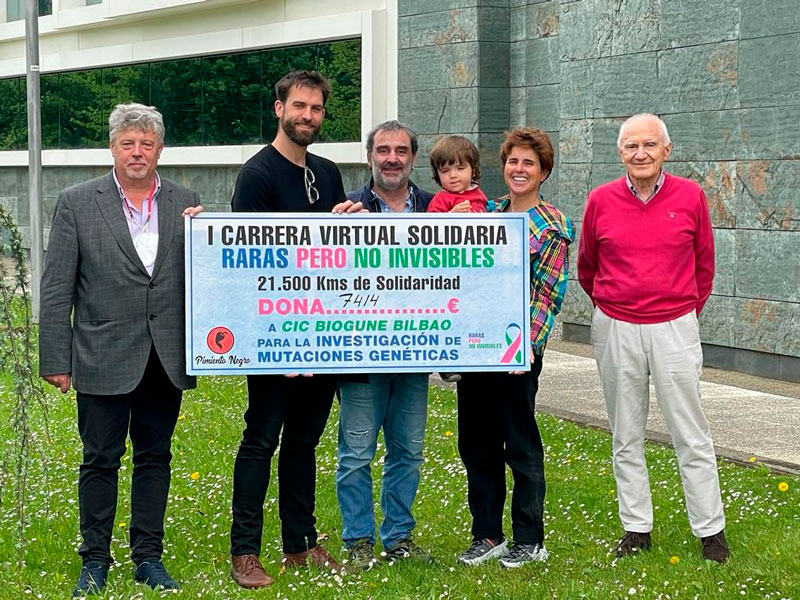
2022/04/28
Virginia Berasategi donates 7,414 euros to the laboratory of Arkaitz Carracedo for research into rare diseases.
The triathlete has taken part in the "Rare but not invisible" fund-raising initiative promoting 7,500 kilometres of solidarity.
The triathlete Virginia Berasategi has donated 7,414 euros to CIC bioGUNE for research into rare diseases. The donation will go to the laboratory of Arkaitz Carracedo, Head of the Research Group at CIC bioGUNE and Ikerbasque research professor.
The money comes from the funds raised through the “Raras pero no invisibles” (Rare but not invisible) initiative, through which sports enthusiasts can contribute through 7,500 kilometres of solidarity. The challenge has been promoted by the ultra long distance cyclist and Guinness World Record holder Alberto 'Il Diavolo' Vallés, and the ultratrail runner Abel Fernández Mendivil, or 'SpiderAbel'.
The aim has been to accumulate 7,500 kilometres of solidarity between all the group or individual challenges taken on by different running, ultratrail and cycling athletes. “We set a minimum target of 7,500 kilometres because that is the number of people affected by rare diseases in the Basque Country, and we want to dedicate at least one kilometre to each one of them”, explains Virginia Berasategi, whose son Luka was born with a malformation of the left occipital region of the brain, cortical dysplasia and cortical blindness, as a result of a mutation in the PTEN gene.
The team led by Arkaitz Carracedo has been studying the PTEN gene, one of the genes involved in these rare diseases, for the past decade, and will use this donation to continue their research in this line. The team bases its line of research on the conviction that the knowledge acquired from understanding the function of this gene in cancer could shed light on its contribution to the development of rare diseases. Additionally, Carracedo’s team is a member of a European network focused on the study of the PTEN and other related genes in a specific type of rare diseases associated with the overgrowth of certain tissues.
About CIC bioGUNE
The Centre for Cooperative Research in Biosciences (CIC bioGUNE), located in the Bizkaia Technology Park, is a biomedical research organisation conducting cutting-edge research at the interface between structural, molecular and cell biology, with a particular focus on the study of the molecular bases of disease, for use in the development of new diagnostic methods and advanced therapies.
About BRTA
The BRTA is an alliance made up of 4 collaborative research centres (CIC bioGUNE, CIC nanoGUNE, CIC biomaGUNE and CIC energiGUNE) and 12 technology centres (Azterlan, Azti, Ceit, Cidetec, Gaiker, Ideko, Ikerlan, Lortek, Neiker, Tecnalia, Tekniker and Vicometch), with the aim of developing advanced technological solutions for Basque companies.
With the support of the Basque Government, the SPRI Group and the Provincial Councils of the three regional provinces, the alliance seeks to promote collaboration among its centres, to strengthen the conditions to generate and transfer knowledge to companies, contributing to their competitiveness, and to spread Basque scientific and technological capacity outside of the Basque Country.
BRTA has a staff of 3,500 professionals, accounts for 22% of the Basque Country’s R&D investment, generates an annual turnover of over EUR 300 million and files 100 European and international patents per year.
See a large version of the first picture





